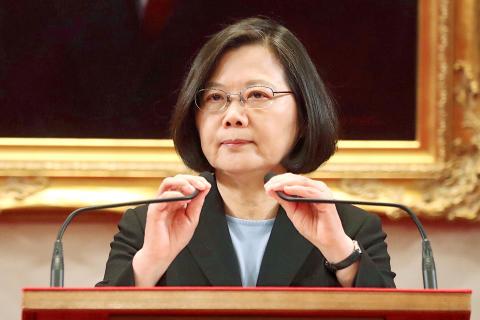President Tsai Ing-wen (蔡英文) yesterday reassured the public that Taiwan’s economic fundamentals are strong enough to withstand the effects of an increase in US tariffs on certain Chinese products, but called on overseas Taiwanese firms to return home amid a renewed trade war between the US and China.
“Starting today, the US is to increase tariffs on US$200 billion of Chinese goods from 10 percent to 25 percent, which could have a tremendous impact on the world economy,” Tsai told a news conference following a high-level national security meeting to discuss countermeasures as Washington and Beijing enter a new round of tariffs.
Fortunately, the trade war’s effects on Taiwan remain limited, given that the goods covered by current punitive US tariffs do not include Taiwan’s main export products, she said.

Photo: CNA
Taiwan’s solid economic foundation in the past few years would also allow it to better respond to the heightened trade conflict between the world’s two largest economies, she added.
Tsai cited as examples the nation’s 12 consecutive quarters of economic growth, increased overseas investment and more than NT$250 billion (US$8.1 billion) of repatriated investments by Taiwanese businesses so far this year.
As the ongoing US-China trade war is bound to affect the existing global trading order and supply chain, Taiwan must choose the correct path for economic development, she said.
“Our goals are to expedite the return of overseas Taiwanese businesses, rebuild our high added-value industries, facilitate comprehensive industrial upgrading and push for the signing of a bilateral trade agreement with the US that adheres to the principles of free and fair trade,” Tsai said.
The government would also work to replace products manufactured in China with those of high value and quality made in Taiwan, seeking to turn the nation into a major exporter of goods to the US, she said.

CHAOS: Iranians took to the streets playing celebratory music after reports of Khamenei’s death on Saturday, while mourners also gathered in Tehran yesterday Iranian Supreme Leader Ayatollah Ali Khamenei was killed in a major attack on Iran launched by Israel and the US, throwing the future of the Islamic republic into doubt and raising the risk of regional instability. Iranian state television and the state-run IRNA news agency announced the 86-year-old’s death early yesterday. US President Donald Trump said it gave Iranians their “greatest chance” to “take back” their country. The announcements came after a joint US and Israeli aerial bombardment that targeted Iranian military and governmental sites. Trump said the “heavy and pinpoint bombing” would continue through the week or as long

TRUST: The KMT said it respected the US’ timing and considerations, and hoped it would continue to honor its commitments to helping Taiwan bolster its defenses and deterrence US President Donald Trump is delaying a multibillion-dollar arms sale to Taiwan to ensure his visit to Beijing is successful, a New York Times report said. The weapons sales package has stalled in the US Department of State, the report said, citing US officials it did not identify. The White House has told agencies not to push forward ahead of Trump’s meeting with Chinese President Xi Jinping (習近平), it said. The two last month held a phone call to discuss trade and geopolitical flashpoints ahead of the summit. Xi raised the Taiwan issue and urged the US to handle arms sales to

BIG SPENDERS: Foreign investors bought the most Taiwan equities since 2005, signaling confidence that an AI boom would continue to benefit chipmakers Taiwan Semiconductor Manufacturing Co’s (TSMC, 台積電) market capitalization swelled to US$2 trillion for the first time following a 4.25 percent rally in its American depositary receipts (ADR) overnight, putting the world’s biggest contract chipmaker sixth on the list of the world’s biggest companies by market capitalization, just behind Amazon.com Inc. The site CompaniesMarketcap.com ranked TSMC ahead of Saudi Aramco and Meta Platforms Inc. The Taiwanese company’s ADRs on Tuesday surged to US$385.75 on the New York Stock Exchange, as strong demand for artificial intelligence (AI) applications led to chip supply constraints and boost revenue growth to record-breaking levels. Each TSMC ADR represents

State-run CPC Corp, Taiwan (CPC, 台灣中油) yesterday said that it had confirmed on Saturday night with its liquefied natural gas (LNG) and crude oil suppliers that shipments are proceeding as scheduled and that domestic supplies remain unaffected. The CPC yesterday announced the gasoline and diesel prices will rise by NT$0.2 and NT$0.4 per liter, respectively, starting Monday, citing Middle East tensions and blizzards in the eastern United States. CPC also iterated it has been reducing the proportion of crude oil imports from the Middle East and diversifying its supply sources in the past few years in response to geopolitical risks, expanding